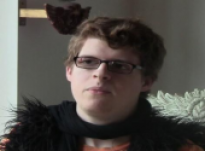Millaa - Interview 14

More about me...
From an early age Millaa had to take care of his younger siblings as well as himself, as his parents were caught up in their own troubles.
From an early age Millaa had to take care of his younger siblings as well as himself, as his parents were caught up in their own troubles.
The stigma and abuse that Millaa experienced for being different was a factor in his anxiety and depression.
The stigma and abuse that Millaa experienced for being different was a factor in his anxiety and depression.
But in the relevance to depression and anxiety and the mental disorder spectrum, I think queer people have a lot of abuse and a lot of depression and a lot of anxiety and a lot of pressures that perhaps people with just - straight people with just depression and anxiety don't. And they couldn't really understand because they're not of that persuasion or that orientation.
Millaa described why he went down 'the therapy route', while acknowledging that for other people pharmacological treatments might work better.
Millaa described why he went down 'the therapy route', while acknowledging that for other people pharmacological treatments might work better.
For me, I've done, done more of the therapy route because I find that that route works better for me because I don't like drugs, like I said. But some people would do the opposite, they like drugs more because it's easier I guess, maybe. And they don't like the ther-, therapy as much because perhaps they don't like to talk about what's making them depressed or anxious. But for me, I like to talk about it, 'cause I think, like I said, it can only help. I think you can only really, you can only really help yourself if you can face your own insecurities and depression.
Millaa's advice to others with experiences of being bullied for being different was to befriend like-minded people and talk to their teachers.
Millaa's advice to others with experiences of being bullied for being different was to befriend like-minded people and talk to their teachers.
Millaa talked about how he felt scrutinised by a number of psychologists and psychiatrist during the process of being diagnosed.
Millaa talked about how he felt scrutinised by a number of psychologists and psychiatrist during the process of being diagnosed.
Millaa outlined his reservations about taking antidepressants.
Millaa outlined his reservations about taking antidepressants.
Millaa talked about the benefits and drawbacks of herbal teas.
Millaa talked about the benefits and drawbacks of herbal teas.
I find though that chamomile and peppermint teas work. One, the peppermint works because it helps with the - if you've got any physical symptoms it just sort of soothes everything. Chamomile helps because it keeps your mind kind of clear. But I only found that it worked - I can only really do that once a day. So, and then it, it’d last for maybe an hour and then it would all start again. But I can only – the effect would only last for about a day. Then I'd have to wait for the next day to have some tea again – for it to work anyway. I'd drink it but it wouldn't have any real impact like it did the first time. Yeah.
Millaa used the metaphor 'going to war' when he described going to school, and said he experienced severe bullying.
Millaa used the metaphor 'going to war' when he described going to school, and said he experienced severe bullying.
Millaa talked about choosing between giving in to or fighting depression, and helping yourself through helping others.
Millaa talked about choosing between giving in to or fighting depression, and helping yourself through helping others.
Millaa connected depression experience with creativity.
Millaa connected depression experience with creativity.
And you know what, I think - I consider depression also like a baptism of fire for dep-, for artistic people. You know that you’re really, you know that there's something creative in you if you've got some sort of depression and it lasts for a while, you know. And if it stems from something like identity or, you know, being queer or something especially, it's probably something to do with - perhaps you're going to get really creative or perhaps there's something in you that needs to be expressed in a way that's probably not, you know, as conventional as sport, or maybe even sport, but you know, maybe something - writing or drawing or singing or music or whatever it might be. I think that that’s, that’s how you really know that you’re a creative person, is if you’ve got a little bit of depression, I think yeah.


